标签:intro imp param status microsoft eal wrap top sha
功能:将长度为100的整形数组的所有成员乘以2。
source:
arry_multi.h
#ifndef _ADD_AXI_H_
#define _ADD_AXI_H_
#include "ap_axi_sdata.h"
void multi_test1(ap_axis<32, 1, 1, 1> data_in[100], ap_axis<32, 1, 1, 1> data_out[100]);
#endif
arry_multi.cpp
#include "arry_multi.h"
void multi_test1(ap_axis<32, 1, 1, 1> data_in[100], ap_axis<32, 1, 1, 1> data_out[100])
{
#pragma HLS INTERFACE s_axilite port=return
#pragma HLS INTERFACE axis register both port=data_out
#pragma HLS INTERFACE axis register both port=data_in
int i;
for (i = 0; i < 100; i++)
{
data_out[i].data = data_in[i].data * 2;
data_out[i].keep = data_in[i].keep;
data_out[i].strb = data_in[i].strb;
data_out[i].user = data_in[i].user;
data_out[i].last = data_in[i].last;
data_out[i].id = data_in[i].id;
data_out[i].dest = data_in[i].dest;
}
}
testbench测试正常后,export RTL,导出IP核。
三种类型的AXI总线:
AXI4
面向高性能地址映射通信的需求;
AXI-Lite
适用于吞吐量较小的地址映射通信总线;
AXI4-Stream
面向高速数据流。
(一)里数组成员乘2的IP核所用的接口约束是stream类型的,所以这里用AXI4-Stream接口。
几种常用的AXI-Stream接口:
AXI DMA
PS memory 到 PL外设高速传输通道,AXI-HP(high performance)<-->AXI-Stream;
AXI DataMover
PS memory到PL外设高速传输通道,AXI-HP<-->AXI-Stream,只不过这次是完全由PL控制的,PS是完全被动的;
AXI Video DMA
PS memory到PL外设高速传输通道,AXI-HP<-->AXI-Stream,针对于视频、图片等二维数据。
这里选择AXIDMA。
环路:
PS通过AXI-lite向DMA发送指令,AXIDMA通过HP通路和DDR交换数据,PL通过AXI-S读写DMA的数据
环路图:
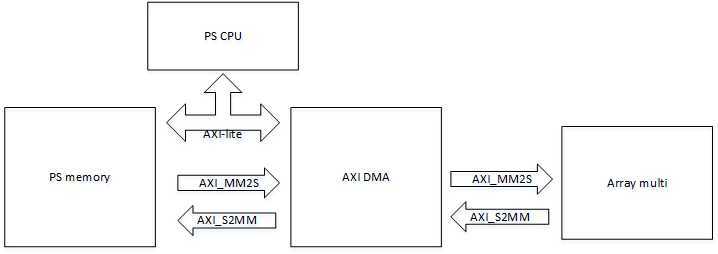
在setting->IP->repository中导入HLS生成的IP核
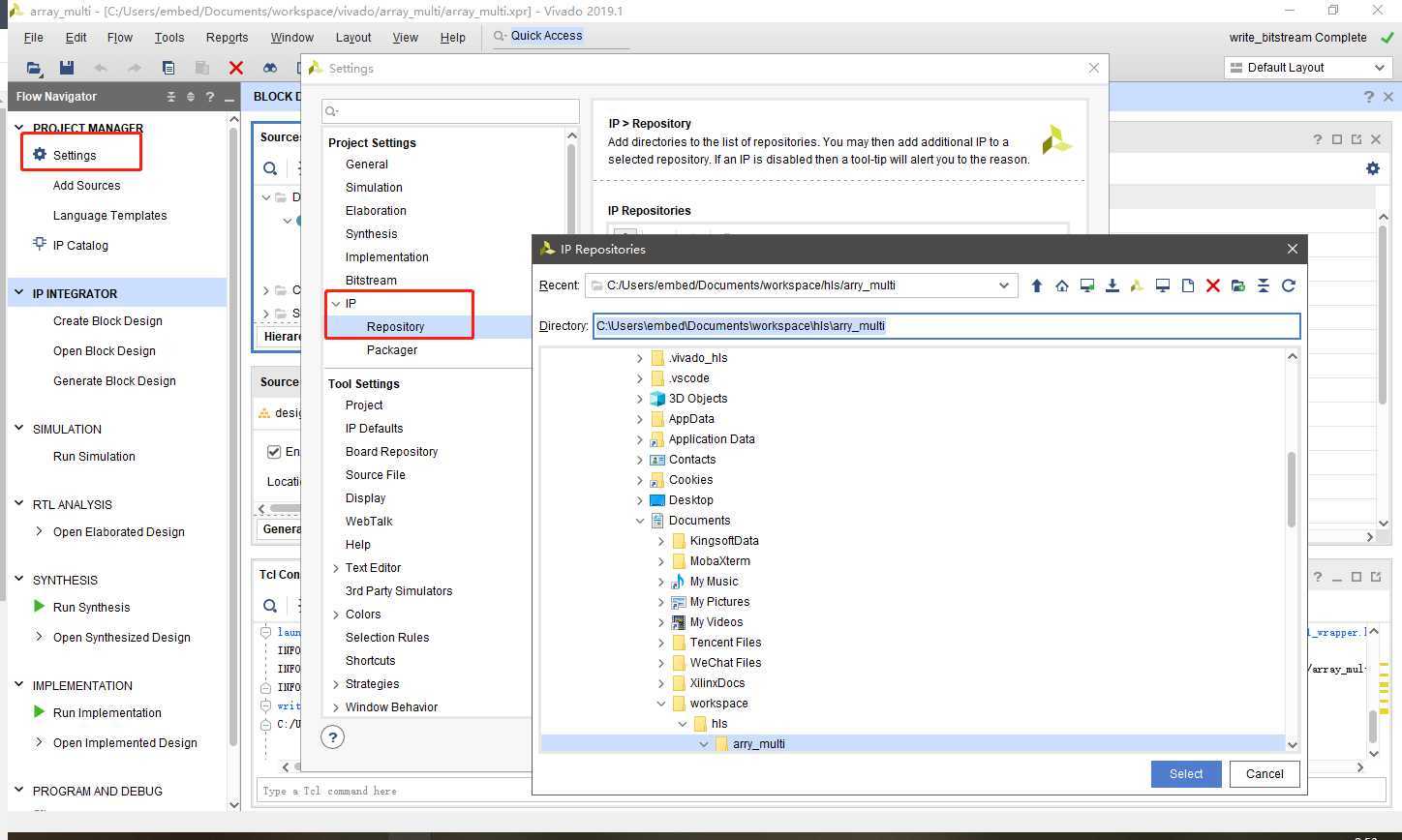
在Block Design里添加如图所示的IP核
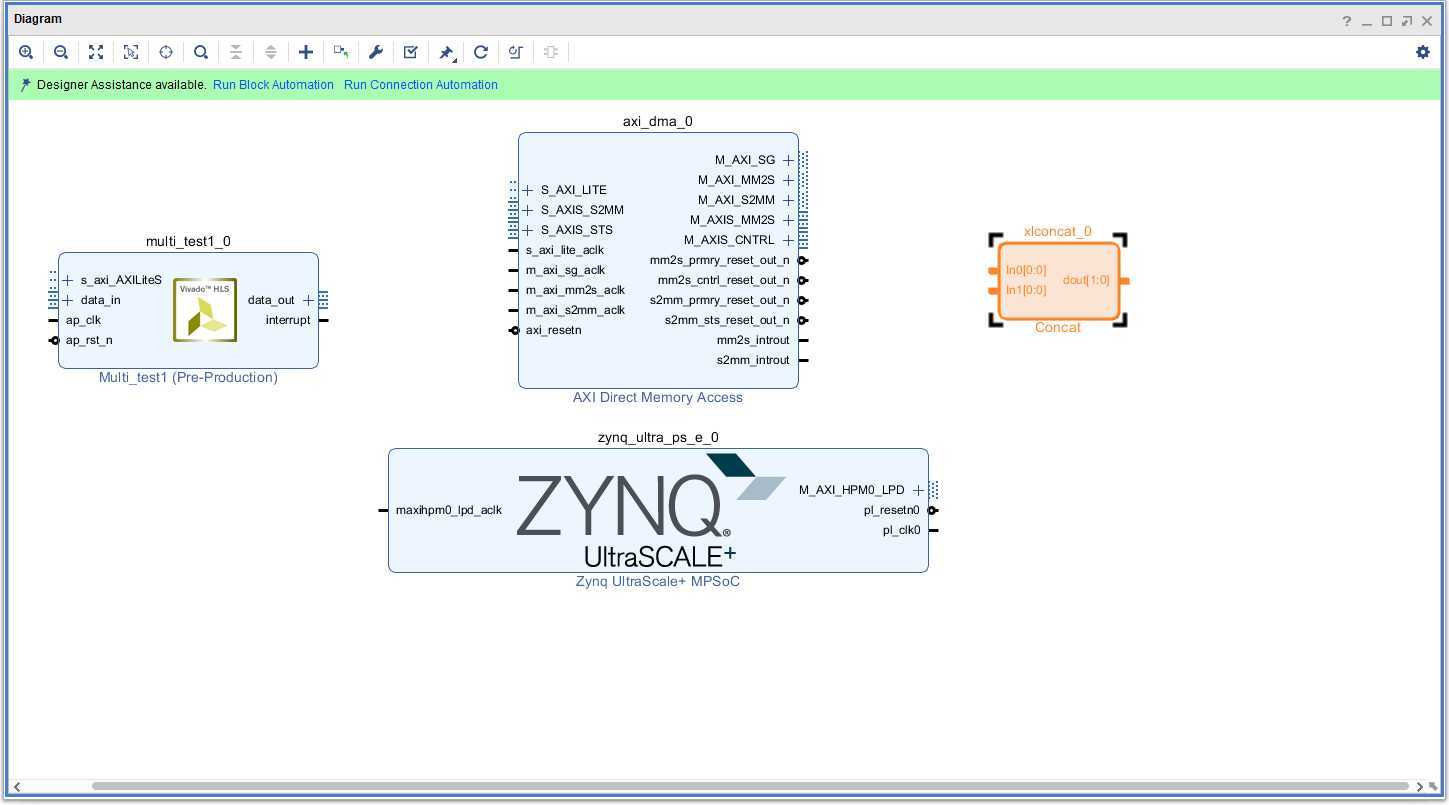
配置PS参数
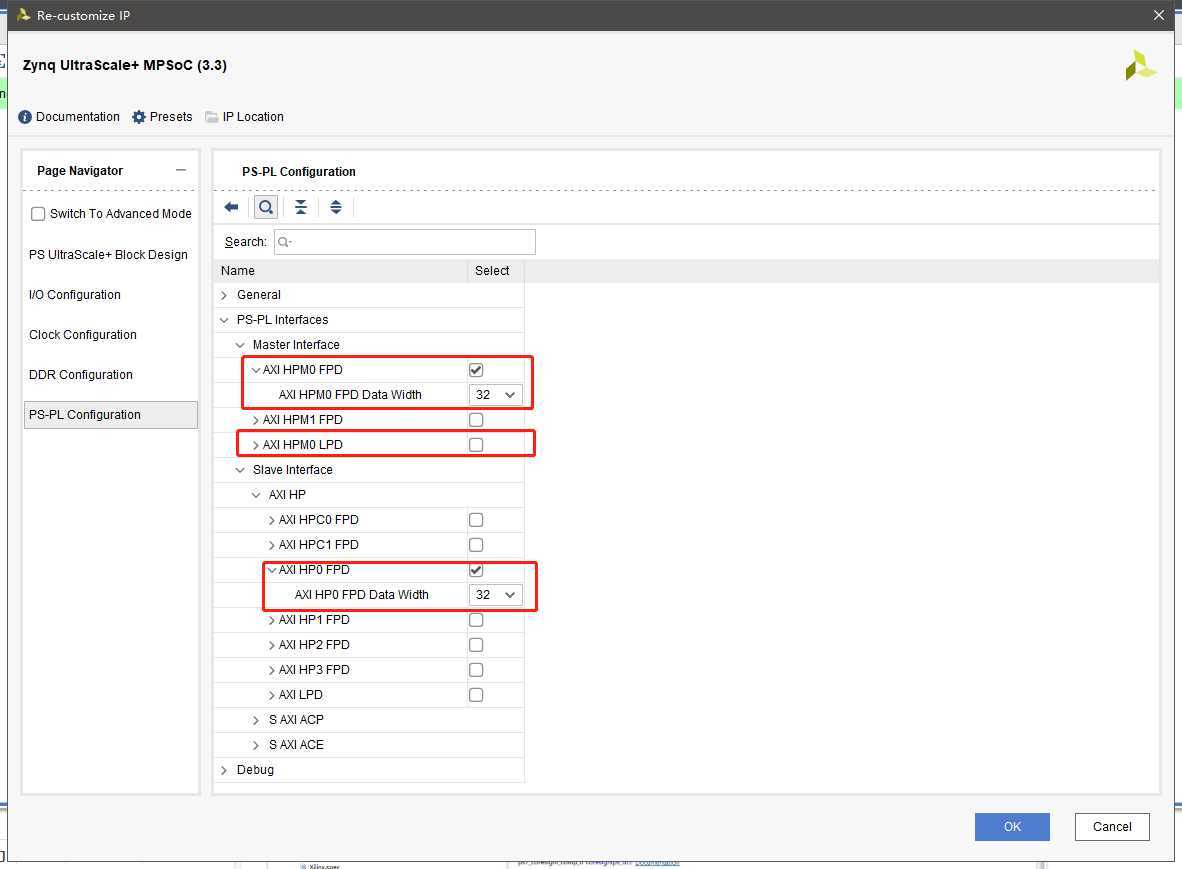
配置DMA参数
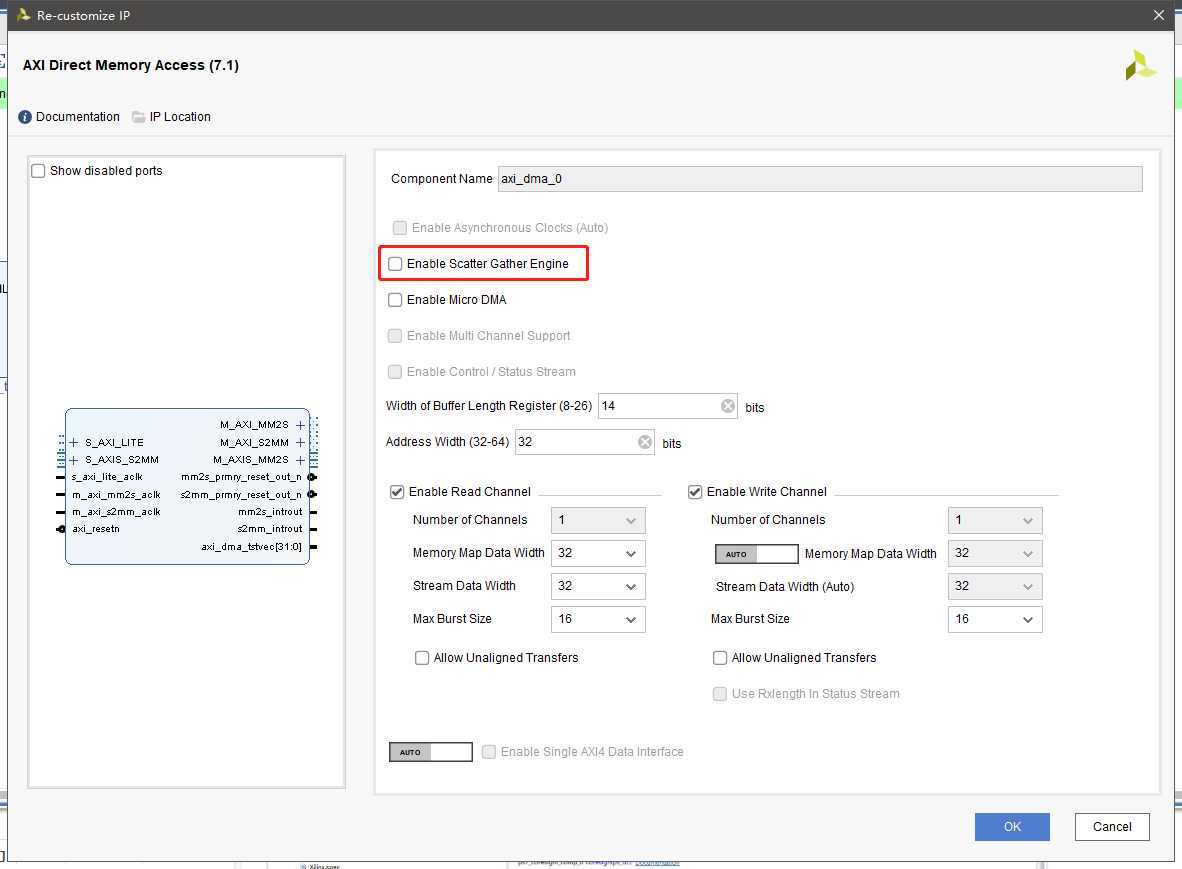
自动布局、手动连线
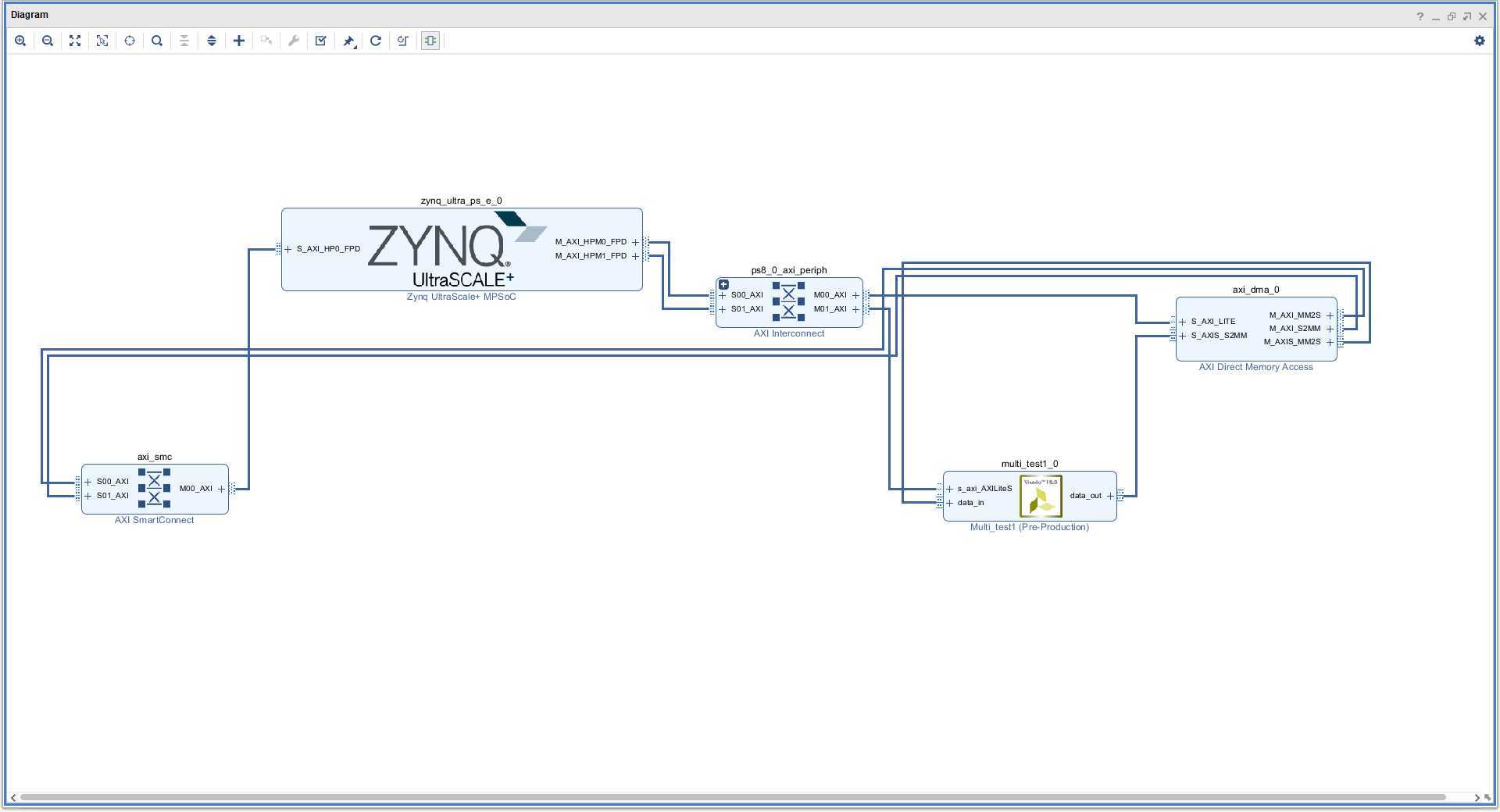
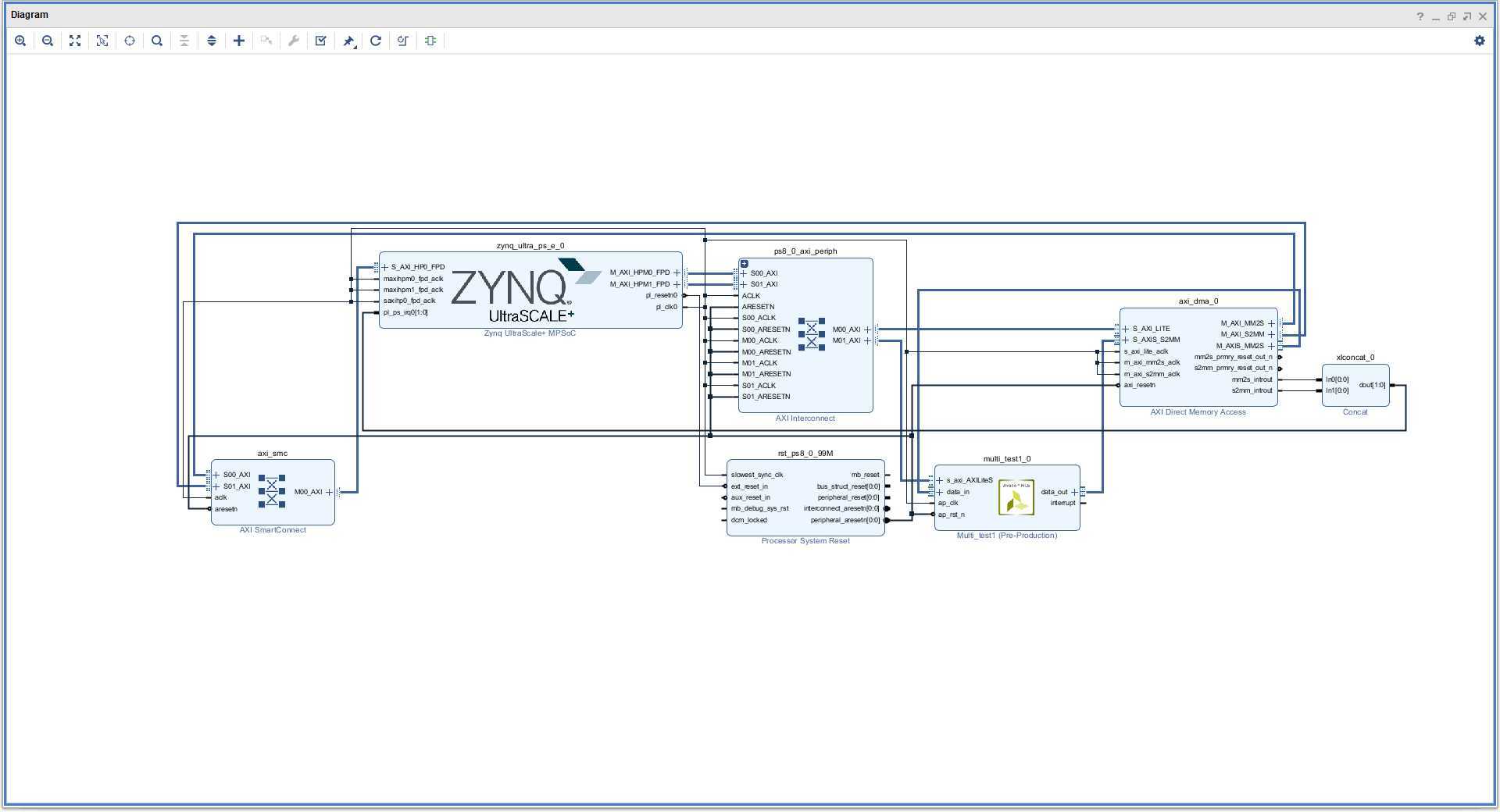
按照流程:generate output product、create HDL wrapper、generate bitstream、launch SDK
可以在system.mss里导入几个dma的demo,先看下官方的示例。
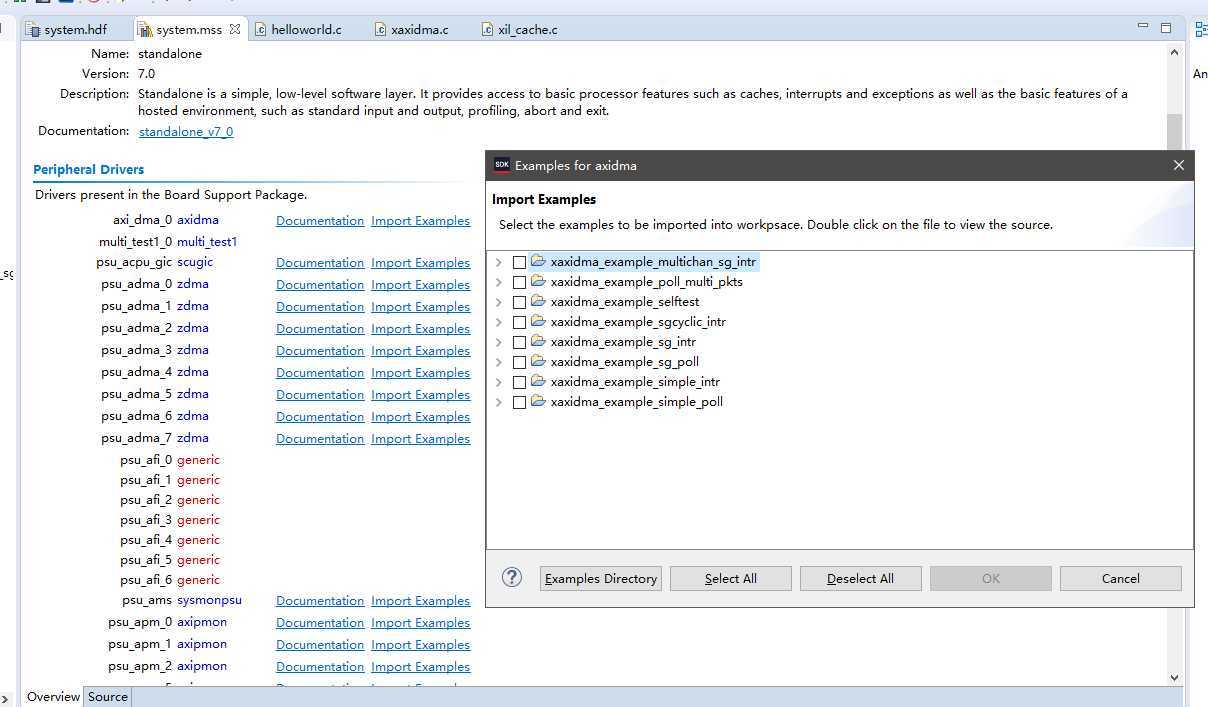
新建helloword工程,helloworld.c改写如下:
/******************************************************************************
*
* Copyright (C) 2009 - 2014 Xilinx, Inc. All rights reserved.
*
* Permission is hereby granted, free of charge, to any person obtaining a copy
* of this software and associated documentation files (the "Software"), to deal
* in the Software without restriction, including without limitation the rights
* to use, copy, modify, merge, publish, distribute, sublicense, and/or sell
* copies of the Software, and to permit persons to whom the Software is
* furnished to do so, subject to the following conditions:
*
* The above copyright notice and this permission notice shall be included in
* all copies or substantial portions of the Software.
*
* Use of the Software is limited solely to applications:
* (a) running on a Xilinx device, or
* (b) that interact with a Xilinx device through a bus or interconnect.
*
* THE SOFTWARE IS PROVIDED "AS IS", WITHOUT WARRANTY OF ANY KIND, EXPRESS OR
* IMPLIED, INCLUDING BUT NOT LIMITED TO THE WARRANTIES OF MERCHANTABILITY,
* FITNESS FOR A PARTICULAR PURPOSE AND NONINFRINGEMENT. IN NO EVENT SHALL
* XILINX BE LIABLE FOR ANY CLAIM, DAMAGES OR OTHER LIABILITY,
* WHETHER IN AN ACTION OF CONTRACT, TORT OR OTHERWISE, ARISING FROM, OUT OF
* OR IN CONNECTION WITH THE SOFTWARE OR THE USE OR OTHER DEALINGS IN THE
* SOFTWARE.
*
* Except as contained in this notice, the name of the Xilinx shall not be used
* in advertising or otherwise to promote the sale, use or other dealings in
* this Software without prior written authorization from Xilinx.
*
******************************************************************************/
/*
* helloworld.c: simple test application
*
* This application configures UART 16550 to baud rate 9600.
* PS7 UART (Zynq) is not initialized by this application, since
* bootrom/bsp configures it to baud rate 115200
*
* ------------------------------------------------
* | UART TYPE BAUD RATE |
* ------------------------------------------------
* uartns550 9600
* uartlite Configurable only in HW design
* ps7_uart 115200 (configured by bootrom/bsp)
*/
#include
#include "platform.h"
#include "xil_printf.h"
#include "xaxidma.h"
#include "xmulti_test1.h"
#include "xparameters.h"
#include "xil_exception.h"
#include "xscugic.h"
#include "xil_cache.h"
#include "xdebug.h"
XAxiDma dma;
XMulti_test1 multi;
XScuGic gic;
int tx_done;
int rx_done;
int Error;
#define RESET_TIMEOUT_COUNTER 10000
#define MAX_PKT_LEN 100
#define MEM_BASE_ADDR 0x01000000
#define TX_BUFFER_BASE (MEM_BASE_ADDR + 0x00300000)
#define RX_BUFFER_BASE (MEM_BASE_ADDR + 0x00500000)
u32 *TxBufferPtr = (u32*)TX_BUFFER_BASE;
u32 *RxBufferPtr = (u32*)RX_BUFFER_BASE;
int init_dma(void);
void init_HLS_multi(void);
int init_gic(void);
void init_exception(void);
int init_dma_intr(void);
void dma_tx_intr_handler(void *Callback);
void dma_rx_intr_handler(void *Callback);
int dma_test(void);
int main()
{
//Xil_DCacheDisable();
//Xil_ICacheDisable();
init_dma();
init_HLS_multi();
init_gic();
init_exception();
init_dma_intr();
dma_test();
return 0;
}
int init_dma(void)
{
int status;
XAxiDma_Config *dma_cfg = NULL;
dma_cfg = XAxiDma_LookupConfig(XPAR_AXIDMA_0_DEVICE_ID);
status = XAxiDma_CfgInitialize(&dma, dma_cfg);
if (status != XST_SUCCESS)
{
print("init dma failed\n\r");
return XST_FAILURE;
}
// print("init dma succeed\n\r");
return XST_SUCCESS;
}
void init_HLS_multi(void)
{
XMulti_test1_Config *multi_cfg;
XMulti_test1_Initialize(&multi, XPAR_XMULTI_TEST1_0_DEVICE_ID);
multi_cfg = XMulti_test1_LookupConfig(XPAR_XMULTI_TEST1_0_DEVICE_ID);
XMulti_test1_CfgInitialize(&multi, multi_cfg);
XMulti_test1_Start(&multi);
// print("init HLS multi succeed\n\r");
}
int init_gic(void)
{
int status;
XScuGic_Config *gic_cfg = NULL;
gic_cfg = XScuGic_LookupConfig(XPAR_SCUGIC_0_DEVICE_ID);
status = XScuGic_CfgInitialize(&gic, gic_cfg, gic_cfg->CpuBaseAddress);
if (status != XST_SUCCESS)
{
print("init gic failed\n\r");
return XST_FAILURE;
}
// print("init gic succeed\n\r");
return XST_SUCCESS;
}
void init_exception(void)
{
Xil_ExceptionInit();
Xil_ExceptionRegisterHandler(XIL_EXCEPTION_ID_INT, (Xil_ExceptionHandler)XScuGic_InterruptHandler, &gic);
Xil_ExceptionEnable();
// print("init exception succeed\n\r");
}
int init_dma_intr(void)
{
int status;
XScuGic_SetPriorityTriggerType(&gic, XPAR_FABRIC_AXI_DMA_0_MM2S_INTROUT_INTR, 0xA0, 0x3);
XScuGic_SetPriorityTriggerType(&gic, XPAR_FABRIC_AXI_DMA_0_S2MM_INTROUT_INTR, 0xA0, 0x3);
status = XScuGic_Connect(&gic, XPAR_FABRIC_AXI_DMA_0_MM2S_INTROUT_INTR, (Xil_InterruptHandler)dma_tx_intr_handler, &dma);
if (status != XST_SUCCESS)
{
return status;
}
status = XScuGic_Connect(&gic, XPAR_FABRIC_AXI_DMA_0_S2MM_INTROUT_INTR, (Xil_InterruptHandler)dma_rx_intr_handler, &dma);
if (status != XST_SUCCESS)
{
return status;
}
XScuGic_Enable(&gic, XPAR_FABRIC_AXI_DMA_0_MM2S_INTROUT_INTR);
XScuGic_Enable(&gic, XPAR_FABRIC_AXI_DMA_0_S2MM_INTROUT_INTR);
XAxiDma_IntrEnable(&dma, XAXIDMA_IRQ_ALL_MASK, XAXIDMA_DMA_TO_DEVICE);
XAxiDma_IntrEnable(&dma, XAXIDMA_IRQ_ALL_MASK, XAXIDMA_DEVICE_TO_DMA);
// print("init dma intr succeed\n\r");
return XST_SUCCESS;
}
void dma_rx_intr_handler(void *Callback)
{
u32 IrqStatus;
int TimeOut;
UINTPTR RxPacket;
RxPacket = (u32*)RxBufferPtr;
Xil_DCacheInvalidateRange((UINTPTR)RxPacket, 100);
XAxiDma *AxiDmaInst = (XAxiDma *)Callback;
/* Read pending interrupts */
IrqStatus = XAxiDma_IntrGetIrq(AxiDmaInst, XAXIDMA_DEVICE_TO_DMA);
/* Acknowledge pending interrupts */
XAxiDma_IntrAckIrq(AxiDmaInst, IrqStatus, XAXIDMA_DEVICE_TO_DMA);
/*
* If no interrupt is asserted, we do not do anything
*/
if (!(IrqStatus & XAXIDMA_IRQ_ALL_MASK))
{
return;
}
/*
* If error interrupt is asserted, raise error flag, reset the
* hardware to recover from the error, and return with no further
* processing.
*/
if ((IrqStatus & XAXIDMA_IRQ_ERROR_MASK))
{
Error = 1;
/* Reset could fail and hang
* NEED a way to handle this or do not call it??
*/
XAxiDma_Reset(AxiDmaInst);
TimeOut = RESET_TIMEOUT_COUNTER;
while (TimeOut)
{
if (XAxiDma_ResetIsDone(AxiDmaInst))
{
break;
}
TimeOut -= 1;
}
return;
}
/*
* If completion interrupt is asserted, then set RxDone flag
*/
if ((IrqStatus & XAXIDMA_IRQ_IOC_MASK))
{
rx_done = 1;
}
}
void dma_tx_intr_handler(void *Callback)
{
u32 IrqStatus;
int TimeOut;
XAxiDma *AxiDmaInst = (XAxiDma *)Callback;
/* Read pending interrupts */
IrqStatus = XAxiDma_IntrGetIrq(AxiDmaInst, XAXIDMA_DMA_TO_DEVICE);
/* Acknowledge pending interrupts */
XAxiDma_IntrAckIrq(AxiDmaInst, IrqStatus, XAXIDMA_DMA_TO_DEVICE);
/*
* If no interrupt is asserted, we do not do anything
*/
if (!(IrqStatus & XAXIDMA_IRQ_ALL_MASK))
{
return;
}
/*
* If error interrupt is asserted, raise error flag, reset the
* hardware to recover from the error, and return with no further
* processing.
*/
if ((IrqStatus & XAXIDMA_IRQ_ERROR_MASK))
{
Error = 1;
/*
* Reset should never fail for transmit channel
*/
XAxiDma_Reset(AxiDmaInst);
TimeOut = RESET_TIMEOUT_COUNTER;
while (TimeOut)
{
if (XAxiDma_ResetIsDone(AxiDmaInst))
{
break;
}
TimeOut -= 1;
}
return;
}
/*
* If Completion interrupt is asserted, then set the TxDone flag
*/
if ((IrqStatus & XAXIDMA_IRQ_IOC_MASK))
{
tx_done = 1;
}
}
int dma_test(void)
{
int status;
tx_done = 0;
rx_done = 0;
Error = 0;
u32 value = 0x00000000;
int index;
for (index = 0; index < MAX_PKT_LEN; index++)
{
TxBufferPtr[index] = value;
value = (value + 1) & 0xFFFFFFFF;
}
printf("data_in:\n\r");
int y;
for (y = 0; y < 100; y++)
{
printf("%03d ", TxBufferPtr[y]);
if (y % 10 == 9)
{
printf("\n\r");
}
}
Xil_DCacheFlushRange((INTPTR)TxBufferPtr, MAX_PKT_LEN * sizeof(u32));
status = XAxiDma_SimpleTransfer(&dma, (UINTPTR)TxBufferPtr, MAX_PKT_LEN * sizeof(u32), XAXIDMA_DMA_TO_DEVICE);
if (status != XST_SUCCESS)
{
printf("XAxiDma_SimpleTransfer dma to device failed.\n\r");
return XST_FAILURE;
}
status = XAxiDma_SimpleTransfer(&dma, (UINTPTR)RxBufferPtr, MAX_PKT_LEN * sizeof(u32), XAXIDMA_DEVICE_TO_DMA);
if (status != XST_SUCCESS)
{
printf("XAxiDma_SimpleTransfer device to dma failed.\n\r");
return XST_FAILURE;
}
while (!tx_done || !rx_done)
{
}
tx_done = 0;
rx_done = 0;
printf("data_out:\n\r");
for (y = 0; y < 100; y++)
{
printf("%03d ", RxBufferPtr[y]);
if (y % 10 == 9)
{
printf("\n\r");
}
}
if (Error)
{
printf("failed.\n\r");
}
if (status != XST_SUCCESS)
{
return XST_FAILURE;
}
return XST_SUCCESS;
}
运行结果:
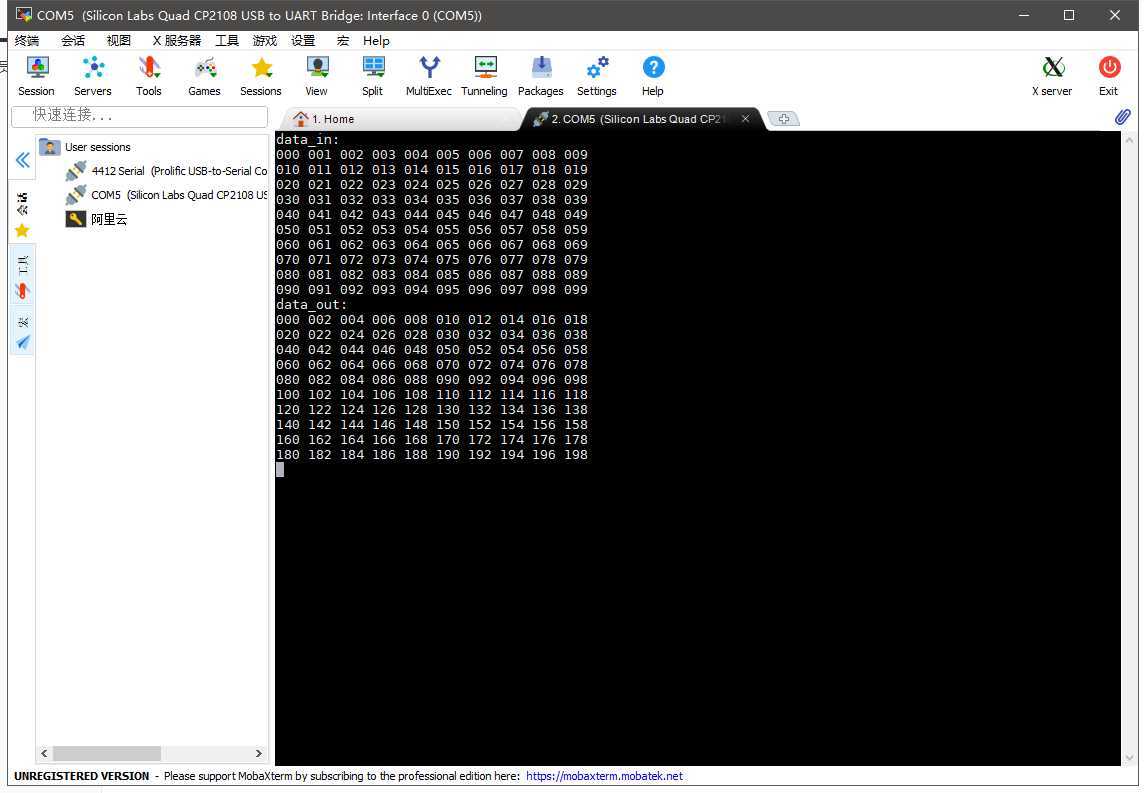
标签:intro imp param status microsoft eal wrap top sha
原文地址:https://www.cnblogs.com/guangnianxd/p/11521166.html